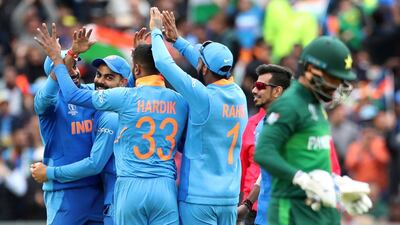The biggest encounter in world sport, this may be. But the ICC might want to think about dropping this fixture in the future. It is rarely close, and the same team always wins.
For the seventh time in World Cups, India played Pakistan. For the seventh time, they won. And, as has become customary, the thrill of the contest in no way matched the hype that went before it.
Rohit Sharma scored a century, just as he had the last time these two sides had met, at the Asia Cup in Dubai last September.
The innings of 140 by “The Hitman” was the centrepiece of India’s 336-5. Even though Mohammed Amir staunched the flow towards the end of the innings, it still felt a vast total.
So it proved, as Pakistan faltered alarmingly in reply, undone – after a promising stand worth 104 by Fakhar Zaman and Babar Azam – by the wrist-spin of Kuldeep Yadav.
After rain limited Pakistan's chase to 40 overs, and the target to 302 via a Duckworth-Lewis-Stern revision, they ended up way short, and lost by 89 runs.
It was an ill-fitting denouement to what had been routinely described as the most-anticipated fixture in all of sport.
Around 20 per cent of the world’s population were said to have had at least a passing interest in the outcome of the game.
The players would have been right to be feeling the burden of expectation. The contrasting ways they went about dealing with it spoke volumes.
India, it appeared, had a firm grip on their emotions. That is perhaps easier to do when you have the benefit of an extended run of excellent form behind you, and a ranking of No 2 in the world.
Virat Kohli, their captain, had spoken in the build up of being clinical, professional, and of it being just another game. The way they played, it seemed to be just that.
“You’d never guess it was India-Pakistan,” Nasser Hussain said on commentary when Rohit reached three figures off the 85th ball he faced. “It’s just another hundred for Rohit. He doesn’t get bad hundreds.”
Kohli himself was in ruthless form, becoming the fastest player to 11,000 one-day international career runs in the process of making 77 from 65 balls.
The only hint that he might have not been quite as fully tuned in as usual came in his demise. He opted not to review the decision that he was caught behind off Amir, even though ultra-edge suggested he did not hit the ball.
Pakistan, by contrast, seemed to be distracted by the magnitude of the occasion. How could they not be? The day before their coach, Mickey Arthur, had said what happened in the match could define them as cricketers.
“You do something incredible tomorrow, you'll be remembered forever,” Arthur had said on the eve of the game.
Then, on the morning of the match, even the Prime Minister of the country had a say. To be fair, Imran Khan has earned the right to comment, as the only man previously to lead Pakistan to a 50-over world title, in Australia in 1992.
“Unless the pitch is damp, Sarfaraz [Ahmed, Pakistan’s captain] must win the toss and bat,” he tweeted, before adding, “the nation’s prayers are with you all. Good luck.”
Sarfaraz will be hoping there are independent sources who might corroborate his claim, then, that there was moisture in the wicket, after opting to bowl first.
If there was, then Pakistan’s bowlers made poor use of it. And the thinking was doubly botched as they had fielded two specialist spinners, anyway. Topped up by the off-spin of Hafeez and Malik, it added up to 21 overs of spin.
Amir stood out on his own among the bowlers – not for the first time, either at this World Cup, or against this opposition – with 3-47. But he could not carry the fight all on his own.
Once Kuldeep removed Babar and Fakhar in quick succession, and Hardik Pandya accounted for Mohammed Hafeez and Shoaib Malik in successive balls, the game was up for Pakistan.


